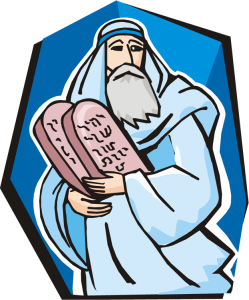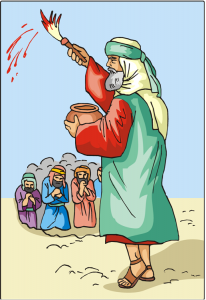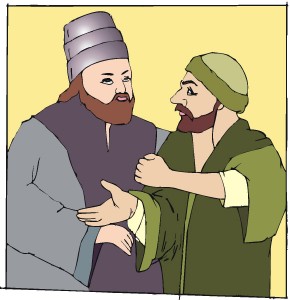Do you know what the biblical term “under the law” means? Most mainstream Christians think it means one thing, but, in reality, it means something else. Understanding the true meaning of this phrase will affect your spiritual walk and relationship with Yeshua (Jesus). When the Apostle Paul uses this term, is he taking a stand for or against the Torah-law of Moses? This video answers these questions.
Tag Archives: Torah
Are you a picky eater?
John 6:54, Flesh…blood. This is a Hebrew idiom for “the whole person” (see Matt 16:17; 1 Cor 15:50; Gal 1:6; Eph 6:12; Heb 2:14). This relates to Moses’ instructions that “man shall not live by bread alone…but by every word that proceeds from the mouth of YHVH” (Deut 8:3). This applies to Yeshua who was that Word of Elohim who “became flesh and dwelt among us” (John 1:1 and 14).
When one puts their faith in or believes in Yeshua (John 6:29 and 5:24), then one must also believe him — that is, not only accept him as the Son of Elohim and one’s Savior, but also follow and obey (or “eat”) him who is the Living Manna-Word of Elohim from heaven. This involves believing his words by loving him and keeping his Torah-commands (John 14:15, 23 cp. Exod 20:6), which are his words.
This is why YHVH instructed the Israelites to eat the whole Passover lamb, and to leave nothing left over (Exod 12:10). This teaches us that we are to “eat” all of Yeshua — his whole Person as represented by the bread and the wine at communion on Passover. We are to accept the totality of his Word, not just the parts that suit us, or fit with our conventional religious viewpoints as per the traditions of men.
Many claim to eat all of his flesh and drink all of his blood, yet through their anti-Torah Continue reading
Traditions of Men Vs. Believing Moses (and Yeshua)
John 5:46–47, Believed Moses. These two verses at the end of chapter five can easily be overlooked, but their implications are huge.
Quite simply, Yeshua is saying that those who don’t believe the writings of Moses (i.e., the Torah) won’t believe the words of Yeshua who himself uphold the Torah and taught its validity in the lives of his disciples.
This then begs the question, “Where does this leave all those who claim to be followers of Yeshua, but who believe that the law of Moses was abrogated?” It’s hard to be absolutely black and white on this matter, since only YHVH can judge the heart condition of each individual, for undoubtedly many who claim the law was “done away with” still adhere to many of the law’s tenets (e.g., you shall not steal, murder, lie, commit adultery, worship idols and you shall honor your parents, etc.) and are thus obedient to the law to one degree or another. However, we can safely say that it’s a matter of degrees: To the degree that we don’t believe the words of Moses, we don’t believe the words of Yeshua who was a proponent (and, in reality, as the Word of Elohim, the Originator) of the Torah-law of Moses.
John makes a similar statement in his first epistle from which we can deduce the following: Continue reading
New Video: Who Are the Biblical “Sons of Light”?
Who are the sons of light that Yeshua and the apostles talked about? What does “light” as a Hebraic metaphor represent in the Bible? How does this relate to Yeshua the Messiah, the gospel message, the disciples of Yeshua and the Torah? How can you become a “son of light”? Watch the video for a surprising if not life changing answer.
Exodus 19–31: An O’view of YHVH’s Marriage to Torah-Obedient Saints
Exodus 19–31 is and overview of YHVH’s marriage to Israel as fulfilled in the lives of redeemed believers.
Start by reading Ezekiel 16:1–14.
Redeemed believers are preparing to be the spiritual bride of Yeshua.
For I am jealous over you with godly jealousy: for I have espoused you to one husband, that I may present you as a chaste virgin to Messiah. (2 Cor 11:2)
Let us be glad and rejoice, and give honour to him: for the marriage of the Lamb is come, and his wife hath made herself ready. And to her was granted that she should be arrayed in fine linen, clean and white: for the fine linen is the righteousness of saints. And he saith unto me, “Write, Blessed are they which are called unto the marriage supper of the Lamb.” And he saith unto me, “These are the true sayings of Elohim.” (Rev 19:7–9)
What are the prophetic implications of and spiritual parallels between YHVH’s first marriage to ancient Israel and YHVH-Yeshua’s upcoming marriage to his bride—the saints who keep his (Torah) commandments and have faith in him (Rev 12:17; 14:12)? In his Parable of the Ten Virgins, Yeshua likens his bride to the five wise virgins who had oil in their lamps. Oil is a Hebraism for the Spirit of Elohim and the Torah. In other words, the prospective bride of Yeshua will walk in the Spirit of Elohim and the truth of Torah, which Yeshua tells us is a mandatory requirement if one is to have a relationship with YHVH (John 4:23–24; 1 John 2:3–6). We learn from the fact that since five foolish virgins who weren’t allowed into the wedding supper that not all redeemed believers will be the bride of Yeshua. Some believers will be the least in YHVH’s kingdom and some will be the greatest (Matt 5:19). According to Yeshua, how obedient one is to the Torah will determine one’s level of rewards in his eternal kingdom (Matt 5:19).
Between Exodus 19 and 24, we find recorded the steps Israel took to enter into a Continue reading
One People One Law
Exodus 12: 49, One law. (Other “one law passages include Lev 24:22; Num 9:14; 15:16, 29). The context of this verse regards the observance of Passover (also Num 9:14). There was only to be one law pertaining to the observance of Passover for both the native Israelite and for the stranger who sojourns with the Israelite.
Leviticus 24:22 says that there is one law for the Israelite and the stranger in the areas of blasphemy, murder, slaying another man’s animal and harming one’s neighbor in any way.
Pertaining to the law about the various offerings for sin (i.e, despising the instructions or Torah of Elohim, verse 31), Numbers 15:15–16 and 29 states there is one law for both the Israelite and the sojourner forever throughout their generations.
Some will say that these “one Torah for everyone” passages pertain only to the specific Torah laws mentioned in these passages. This interpretation seems to be a strain, since, as noted above, the Leviticus 24 passage seems to include all of Torah. Furthermore, in numerous places, Israel was to take the Torah (the whole Torah) to the nations of the world, not just parts of the Torah (e.g., Deut 4:6–8; Isa 60:1–3; Zech 8:22–23; Matt 28:18–20; Luke 24:47), and that during the Messianic Age, the Torah will go forth to all the nations (Isa 2:3; Mic 4:2). So the Torah is not just for Israel only, but ultimately was to be for all the peoples of the earth.
Are You ‘Not Far From’ the Kingdom or ‘In’ the Kingdom?
Mark 12:34, You are not far from the kingdom. Yeshua makes this complimentary statement to the scribe who had correctly and succinctly summarized the message of the Torah (both its letter and spirit intent) in verses 32–33.
However, note that Yeshua didn’t say, “You are in the kingdom of Elohim (i.e., you have eternal life).”
What was the one thing that kept the scribe from being in the kingdom? It was doubtless the same thing that kept the rich young ruler from obtaining the eternal life that he sought (Matt 19:16).
After having obeyed the Torah the best he could, the young ruler still needed to surrender all to Yeshua the Messiah, and to follow him unreservedly (Matt 19:18–22).
Not only is it difficult for humans to surrender all to the Master, and then to follow him wherever he leads, but having followed the Torah the best we can, we must still humbly recognize that without the righteousness of Yeshua in the equation, our best efforts at Torah-obedience will still miss the mark of YHVH Elohim’s acceptable standard of righteousness, thus leaving us maybe not far from the kingdom, but definitely not in the kingdom of Elohim.






